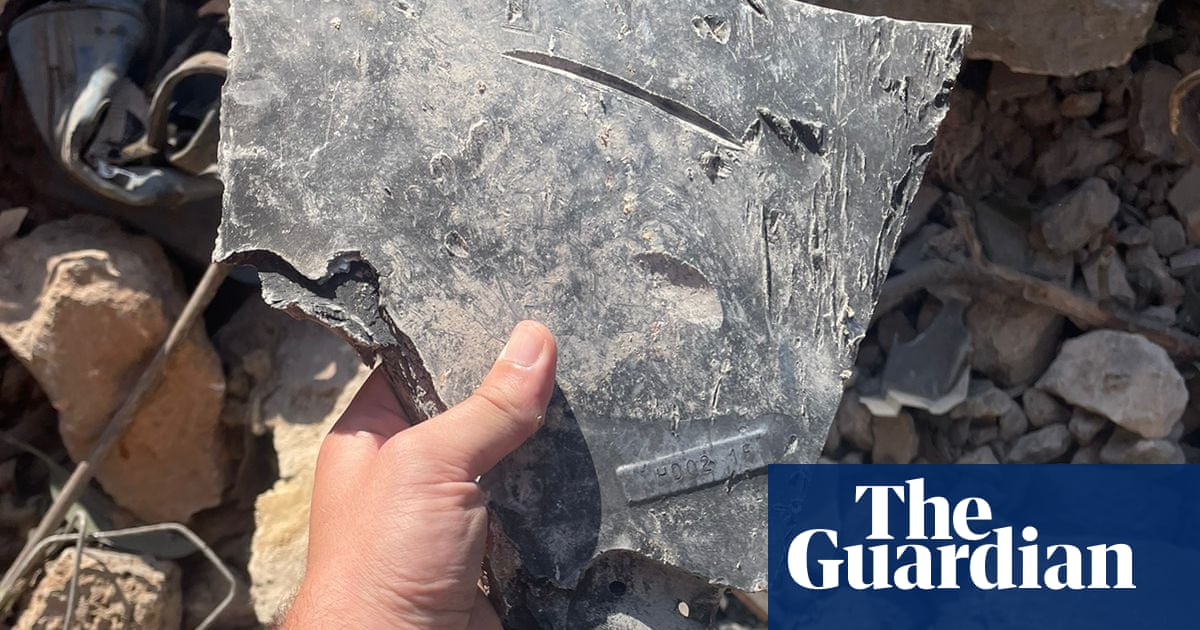A US-made munition was used in a strike on central Beirut that killed 22 people and wounded 117, according to an analysis of shrapnel found by the Guardian at the scene of the attack.
The strike on Thursday night hit an apartment complex in the densely populated neighbourhood of Basta, levelling the apartment building and destroying cars and the interiors of nearby residences.
It was the deadliest strike on Lebanon’s capital city since fighting between Hezbollah and Israel started a year ago.
A first responder on the scene said rescue crews had worked overnight to find survivors and recover the dead from under rubble. They said the building had more people living there than usual as residents had recently welcomed people displaced from Israeli bombing in south Lebanon and the southern suburbs of Beirut. That elevated the number of people wounded and killed in the airstrike.
The building was one of two hit in central Beirut on Thursday night, targeting the senior Hezbollah figure Wafiq Safa, the head of the group’s liaison and coordination unit and responsible for working with Lebanese security agencies. According to Reuters, Safa survived the assassination attempt.
The Guardian found remnants of a US-manufactured joint direct attack munition (Jdam) in the rubble of the collapsed apartment building on Friday afternoon. Jdams are guidance kits built by the US aerospace company Boeing that attach to large “dumb bombs” ranging up to 2,000lbs (900kg), converting them into GPS-guided bombs.
The weapons remnant was verified by the crisis, conflict and arms division of Human Rights Watch and a former US military bomb technician.
“The bolt pattern, its position and the shape of the of the remnant are consistent with the tail fin of a US-made, Jdam, guidance kit for Mk80 series air-dropped munitions,” said Richard Weir, a senior researcher in Human Rights Watch’s crisis, conflict and arms division, after viewing a photograph of the fragment. The Mk80 series encompasses three classes of bomb, the smallest of which is 500lbs and the largest is 2,000lbs.
“The use of these weapons in densely populated areas, like this one, places civilians and civilian objects in the immediate area at grave risk of immediate and lasting harm,” Weir said.
US weapons have been key to Israel’s war in Gaza and Lebanon, with Jdams specifically being one of Israel’s most requested munitions from the US. A previous investigation by the Guardian found that a Jdam was used in an attack that killed seven healthcare workers, deemed a violation of international law by Human Rights Watch.
Thursday’s attack marks the first time that a US-made munition is confirmed to have been used in an attack on central Beirut since 2006.
The US has come under heavy criticism for its continued military aid to Israel, which amounted to $17.9bn last year. In September, more than a dozen rights organisations signed a joint letter to the US president, Joe Biden, calling on him to suspend arms transfers to Israel, citing the use of US munitions in attacks in Gaza against civilians. Israel is currently fighting a case in the international court of justice filed by South Africa, which accuses Israel of perpetrating “genocidal acts” in its war on Gaza.
In Lebanon, people have been left reeling by the intensity of Israel’s aerial campaign in the country, which started on 23 September.
People living in the apartment that was struck who survived still seemed to be in a state of shock on Friday afternoon. A husband and wife stepped gingerly over rubble to reach what used to be their apartment, picking up clothes strewn across the ground and placing them in a plastic bag filled with what few belongings they could salvage.
Ali, a 30-year-old man who lives on a nearby street, was standing at the site of the strike on Friday afternoon, carrying a picture of his uncle who was killed the night before and reciting a prayer under his breath as he thumbed prayer beads. His uncle was from Mays al-Jabal, a town on the Israel-Lebanon frontier, and had recently fled to stay with his relatives in Beirut.
“This strike is painful not just for him and his loved ones, but to everyone that he helped and served. This place was supposed to be safe,” Ali said.
Basta is a working-class, largely Sunni Muslim, neighbourhood famed for its antiques and traditional architecture. In peak season, tourists are often seen walking through the area and its marketplace, where antiquities and furniture are sold.
More than 2,100 people have been killed and more than 10,212 wounded in Lebanon since Hezbollah fired rockets at Israel on 8 October 2023 “in solidarity” with Hamas’s attack the day before. The majority were killed since 23 September this year, when Israel announced a new phase in its war with Hezbollah, which it called Operation Northern Arrows.

